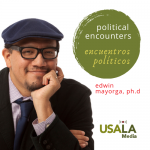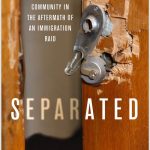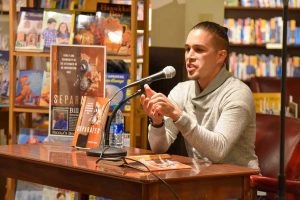 Tune in to Encuentros Políticos/Political Encounters, Sundays at 5p EST on USALAmedia.com
Tune in to Encuentros Políticos/Political Encounters, Sundays at 5p EST on USALAmedia.com
Episode Description
According to an article in the Washington Post from December 2019 during the last fiscal year running from October 1, 2018 through September 30, 2019, Immigration Customs and Enforcement (or ICE), deported more than 267,000 people, or 22,250 per month, a 4 percent increase from the year before, and significantly lower than the peak of 400,000 annual deportations midway through President Barack Obama’s administration. Then in March, with the onset of the COVID19 pandemic, ICE sent notification that their Enforcement and Removal Operations division would “delay enforcement actions” and use “alternatives to detention” amid the outbreak. As a result of these changes, in March 2020, ICE completed 17,965 removals, according to agency records, and total deportations have declined further in April with 2,985 deportations. While COVID19 has forced a precipitous decline of deportations, ICE continues to pursue immigration enforcement while most immigration services, refugee admission and naturalization services have either been slowed or suspended.
What this all amounts to is people’s ongoing vulnerability to removal, detention and other enforcement practices from federal, state and local agencies. An aspect of the current situation that is even less understood are the negative effects enforcement has on individuals, families and communities that goes far beyond the removal of a person. To provide some more perspective on these negative effects, I’m pleased to have Dr. William D. Lopez, author of Separated: Family and Community in the Aftermath of an Immigration Raid, published by Johns Hopkins University Press on Political Encounters/Encuentros Políticos.
Download the episode on Spreaker:
https://www.spreaker.com/episode/29827701
Tune in to Political Encounters on Sundays from 5-6p (EST) at usalamedia.com
Book Description
From Johns Hopkins University Press
 William D. Lopez details the incredible strain that immigration raids conducted by ICE and local law enforcement placed on one Latino community—and the families and friends left behind.
William D. Lopez details the incredible strain that immigration raids conducted by ICE and local law enforcement placed on one Latino community—and the families and friends left behind.
On a Thursday in November of 2013, Guadalupe Morales waited anxiously with her sister-in-law and their four small children. Every Latino man who drove away from their shared apartment above a small auto repair shop that day had failed to return—arrested, one by one, by ICE agents and local police. As the two women discussed what to do next, a SWAT team clad in body armor and carrying assault rifles stormed the room. As Guadalupe remembers it, “The soldiers came in the house. They knocked down doors. They threw gas. They had guns. We were two women with small children… The kids terrified, the kids screaming.”
In Separated, William D. Lopez examines the lasting damage done by this daylong act of collaborative immigration enforcement in Washtenaw County, Michigan. Exploring the chaos of enforcement through the lens of community health, Lopez discusses deportation’s rippling negative effects on families, communities, and individuals. Focusing on those left behind, Lopez reveals their efforts to cope with trauma, avoid homelessness, handle worsening health, and keep their families together as they attempt to deal with a deportation machine that is militarized, traumatic, implicitly racist, and profoundly violent.
Lopez uses this single home raid to show what immigration law enforcement looks like from the perspective of the people who actually experience it. Drawing on in-depth interviews with twenty-four individuals whose lives were changed that day in 2013, as well as field notes, records obtained under the Freedom of Information Act, and his own experience as an activist, Lopez combines rigorous research with narrative storytelling. Putting faces and names to the numbers behind deportation statistics, Separated urges readers to move beyond sound bites and consider the human experience of mixed-status communities in the small everyday towns that dot the interior of the United States.
Bio

Dr. William D. Lopez is a Clinical Assistant Professor at the University of Michigan School of Public Health and Faculty Director of Public Scholarship at the National Center for Institutional Diversity (NCID).
As a Clinical Assistant Professor, William teaches “Health Impacts of Immigration Law Enforcement in the U.S.” This class focuses on the violence of immigration enforcement on the individual, family, and community levels and asks what we, as researchers and advocates, can do to address it.
As the Faculty Director of Public Scholarship, William leads efforts to support the production, dissemination, and application of public scholarship. THis includes organizing the NCID’s Public Scholarship Editorial Board
William has been fortunate to collaborate both in his research and advocacy with the Washtenaw Interfaith Coalition for Immigrant Rights and Synod Community Services, which operate the Washtenaw County ID Program.
Comments by emayorga